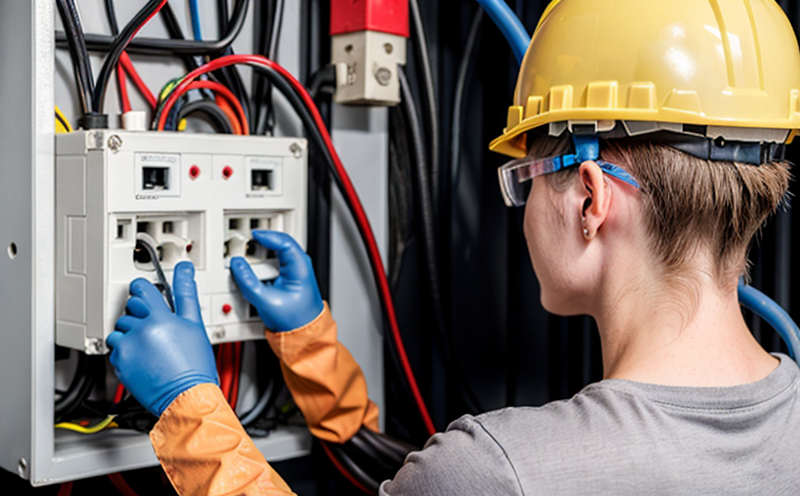UL 746C Polymeric Materials Electrical Insulation Testing for IoT
The UL 746C standard is a critical part of ensuring the safety and reliability of polymeric materials used in electrical insulation, particularly within smart home and Internet of Things (IoT) devices. This test evaluates the performance of insulating materials under various conditions to confirm they meet specified standards for durability and resistance against breakdown due to electrical stress.
During testing, samples are subjected to high-voltage electrical stress that simulates real-world operating environments where these materials might be exposed to voltage surges or other forms of electrical load. The UL 746C test specifically targets polymeric materials, which include plastics and rubber compounds often used in smart home devices like thermostats, lighting systems, and security cameras.
The standard is designed to ensure that the insulation materials do not fail prematurely under expected use conditions, thereby protecting users from potential electrical hazards. By adhering to UL 746C, manufacturers can demonstrate compliance with international safety regulations, which is essential for gaining market access in regions such as North America where stringent standards are enforced.
In addition to meeting regulatory requirements, conducting this test allows companies to enhance their product offerings by ensuring superior quality and reliability. Consumers benefit from safer products that perform consistently over time, reducing the risk of electrical fires or other accidents caused by faulty insulation.
The UL 746C test is performed using specialized equipment capable of generating controlled high-voltage environments. Specimens are carefully prepared according to specific guidelines provided in the standard documentation before being subjected to the test procedure. Results from these tests provide critical insights into how well materials withstand electrical stress without degrading or failing.
Understanding the intricacies behind this testing process can help stakeholders make informed decisions about selecting appropriate materials for their IoT devices. It also highlights why such rigorous evaluation is necessary when dealing with components that interact directly with electricity—something that cannot be overlooked in today’s interconnected world.
Industry Applications
The application of UL 746C testing extends beyond just manufacturing; it plays a pivotal role across multiple sectors including consumer electronics, telecommunications, and industrial automation. For instance:
- Consumer Electronics: Ensuring that smart home devices like speakers or security cameras remain safe for long-term use.
- Telecommunications: Guaranteeing the reliability of network infrastructure components used in data centers or remote stations.
- Industrial Automation: Verifying the integrity of sensors and actuators within manufacturing plants to prevent malfunctions that could lead to downtime or accidents.
In each case, UL 746C testing helps maintain high standards of safety and performance, contributing significantly towards building trust among consumers and stakeholders alike. This is especially important given the increasing reliance on IoT technology in everyday life.
Why Choose This Test
- Compliance with International Standards: Ensures adherence to UL 746C, an internationally recognized standard for electrical insulation materials.
- Rigorous Evaluation Process: Provides comprehensive assessment of material properties under simulated operational conditions.
- Enhanced Product Safety: Minimizes risks associated with faulty insulation leading to potential hazards such as fires or electric shocks.
- Market Access: Helps manufacturers meet regulatory requirements necessary for selling products in North America and other regions following similar standards.
- Better Consumer Trust: Builds confidence among users knowing that the technology they rely on has been thoroughly tested and proven safe.
By choosing this test, you are not only ensuring your product meets strict safety criteria but also positioning yourself as a leader in innovation and quality within the industry. This commitment to excellence will resonate well with customers who value reliability above all else.
Quality and Reliability Assurance
The UL 746C Polymeric Materials Electrical Insulation Testing is integral to maintaining top-tier quality assurance across the entire lifecycle of IoT devices. Here’s why this testing is crucial:
Material Selection: By subjecting materials to rigorous electrical stress, manufacturers can identify those that provide optimal resistance against breakdown while remaining durable enough for everyday use.
Design Optimization: Insights gained from these tests allow engineers to refine designs, improving both functionality and safety without compromising on performance.
Manufacturing Process Validation: Ensures consistent production runs meet the same high standards set forth by UL 746C, thus maintaining product consistency throughout manufacturing batches.
Predictive Maintenance: Understanding how materials behave under extreme conditions enables better planning for maintenance schedules, potentially extending equipment lifespan and reducing unexpected failures.
Customer Satisfaction: Providing reliable products that pass rigorous testing instills confidence in consumers who expect nothing less than the best when it comes to IoT technology.
In summary, incorporating UL 746C into your quality assurance strategy ensures not only compliance with industry norms but also contributes significantly towards enhancing overall product reliability and customer satisfaction.





